Removing Skin Tags With Nail Polish: Safety Concerns And Risks
Everything you need to know before trying this popular home remedy for skin tags.
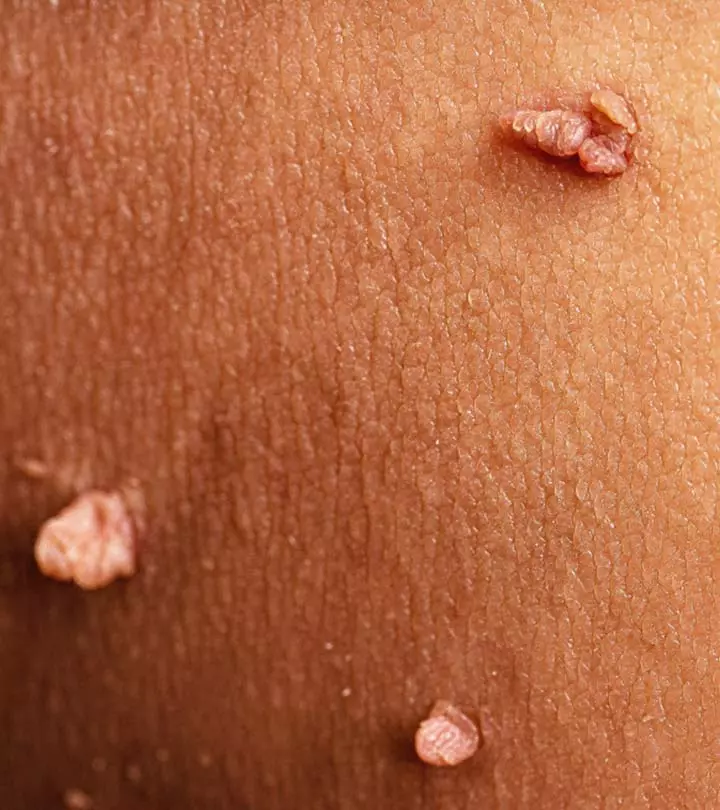
Image: Shutterstock
Removing skin tags with nail polish is a common hack to get rid of fleshy, wart-like growths. However, this home remedy is extremely dangerous and may cause negative side effects. Keep reading to understand why you should not try this remedy at home and other ways to remove skin tags. Read on.
In This Article
What Is A Skin Tag?
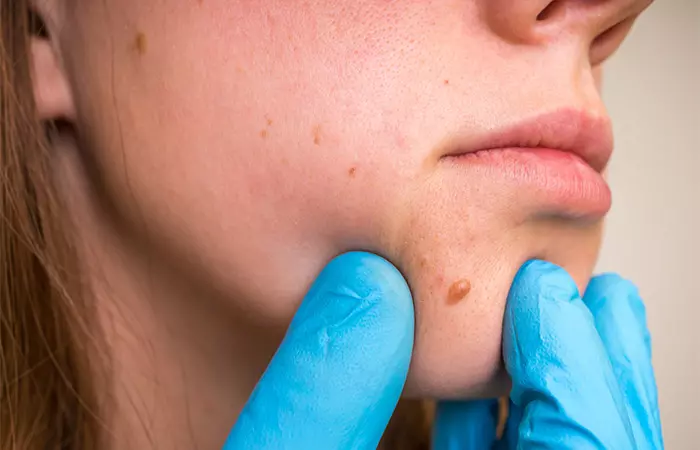
Skin tags are harmless skin growths that appear on the surface of your skin. The medical term for them is acrochordons. They are brown or beige in color and appear on your eyes, neck, face, armpits, and genitals. They occur in almost 25% of the adult population at any age (1). However, skin tags are more common in people above the age of 50.
 Did You Know?
Did You Know?- What Are The Symptoms Of Skin Tags?
Skin tags if left alone aren’t bothersome, but, if you twist or pick them, they may bleed or infect the surrounding skin tissues.
Some of the symptoms of skin tags are as follows.
- They look like a tiny bump on the skin that is soft to touch.
- Over time, they turn into a flesh-colored piece of skin attached to the surface of the skin by a stalk.
- You can develop blood clots if you twist the stalk of the skin tag and it may become painful (2).
- What Are The Causes For Skin Tags?
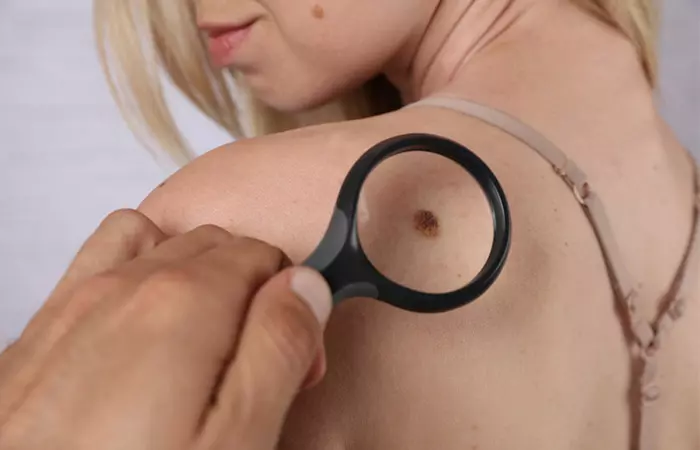
There is no clear-cut reason for skin tags to appear. Some researchers suggest that they appear due to clusters of collageni A protein in the connective tissue, bone, skin, tendons, and cartilage that is responsible for the skin’s elasticity. and blood getting trapped inside a piece of skin. It is common to see them form in areas where your skin folds, like your armpits, under your neck, and genital areas (2).
Friction caused by clothes or pieces of jewelry rubbing against your skin may cause skin tags to appear. Some studies suggest that obesity and genetic disorders may also be a cause for skin tags (3),(4).
Skin tags are generally harmless, however, some people may want to remove them for personal reasons. Skin tags near the genital areas may at times interfere during sexual intercourse. However, if they bleed, change color and size, or if you notice any irregularity, it could potentially be cancerous. Consult a doctor immediately.
In the next section let us discuss some of the safety concerns of using nail polish to remove skin tags.
Key Takeaways
- Anecdotal evidence suggests that nail polish is effective in removing skin tags. However, dermatologists do not recommend this process.
- Dermatologists usually use liquid nitrogen to freeze the skin tag through Cryotherapy. Within a week or so, the skin tag may fall off.
- Topical application of garlic on skin lesions may help alleviate them. However, there is limited research to determine its efficacy.
Safety And Effectiveness of Using Nail Polish On Skin Tags

Nail polish is a toxic substance that is not safe for your skin. Studies suggest that nail polish contains harmful chemicals like toluene sulfonamide-formaldehyde resin and methacrylates that may cause dermatitis. The study also suggests that these compounds can become airborne and may cause asthma and neurocognitivei Cognitive function associated with the interconnected nerve fibers in the brain that are responsible for the ability to think and reason. changes (5).
Some people claim that using nail polish to remove skin tags is an effective technique for them. However, dermatologists do not recommend this process.
If you still want to try this process for yourself and see if it bears results, you have to be cautious.
A blogger shared their unpleasant experience of using nail polish to remove their skin tags. They wrote, ” Used clear nail polish. Painted over the skin tag (in my inner crook of the arm). Skin tag blew up in size — almost blister-like and a little scary — and my skin reacted very poorly to the nail polish, and I developed quite a rash (i).”
Cautions To Be Followed When Removing Skin Tags With Nail Polish
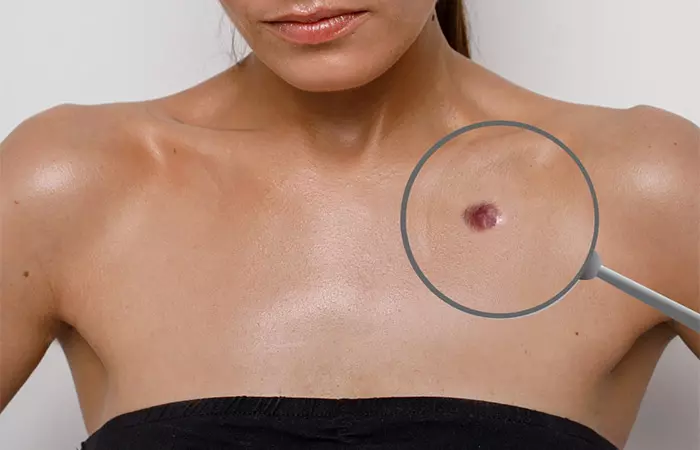
Here are some points to keep in mind before using this method:
- Do not try using nail polish to remove skin tags if you have a pre-existing skin condition.
- Do not try this process to remove skin tags on your genitals and genital areas such as the groin and anus.
- Don’t try this if you are diabetic.
- Do not try this if your skin tag is bleeding or is oozing pus.
- Do not try this if the skin tag is near a mucous membrane, like skin tags on the eyelids or the corner of the eyes, and around the nose.
- Do not try this if the growth has changed appearance.
Using home remedies or DIY beauty hacks such as this may not always give you successful results and you may instead end up causing harm and aggravating the issue. Also, since there is no scientific evidence supporting this DIY method, it’s best to avoid it. Always consult a dermatology expert for safe and effective removal options or natural remedies to ensure overall skin health and wellness.
The most effective way to remove skin tags is through a simple cosmetic procedure. Apart from cosmetic procedures, there are a few other home remedies that people use to remove skin tags. The next section discusses these options.
What Are The Other Ways To Remove Skin Tags?
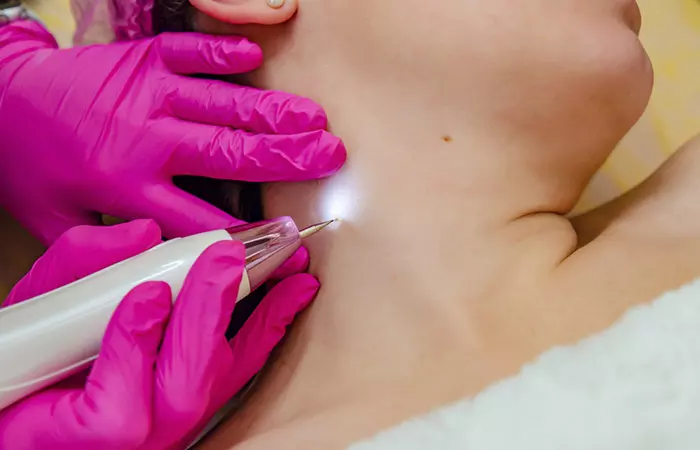
There are cosmetic procedures that give you good results and there are home remedies that have mixed results. However, you must have a sterile environment and past experience in removing skin tags.
There are 4 main cosmetic procedures that can remove skin tags.
1. Cryotherapy
In this procedure, the dermatologist uses liquid nitrogen to freeze the skin tag. Within a week or so you can expect the skin tag to fall off.
2. Cauterization
The dermatologist burns the skin tag and it falls off after the doctor repeats the treatment a couple of times.
3. Ligation
The skin tag is tied with the surgical thread to cut off the blood supply, causing it to gradually fall off.
4. Excision
The doctor applies a local anesthetic to the skin tag and then it is removed with a surgical knife, scalpel, or shaving blade.
 Did You Know?
Did You Know?If cosmetic procedures are not your choice, you may want to try some popular home remedies for skin tags. However, these have not been studied to prove their efficacy.
- Banana Peel
Anecdotal evidence suggests that a banana peel may be effective in removing warts, a condition similar to skin tags (7). Wrapping a banana peel around the skin tag and leaving it overnight to dry the skin tag. Repeat this process till the tag falls off.
- Garlic
Studies suggest the topical application of garlic on corns and other skin lesions may help alleviate them (8). However further research is required to determine its efficacy. Rub crushed garlic on the skin tag and wrap it with a bandage and leave it overnight. Wash the area in the morning and repeat till the tag falls off.
- Tea Tree Oil
Using tea tree oil for skin tags is believed to be very effective. It functions as a natural antiseptic with antibacterial and anti-inflammatory characteristics. It shows promise in combating the human papillomavirus and diminishing warts (9). Some anecdotal evidence also suggests its usefulness in addressing skin tags.
- Vitamin E
Vitamin E has powerful antioxidant properties that may possibly help reduce skin tags. You can apply vitamin E oil or cream to the affected area and massage it gently. Repeating this twice to thrice daily, some believe, offers better results. However, this remedy may not be equally effective for everyone. Consult your dermatologist for more details regarding the same.
Infographic: Alternatives To Nail Polish For Skin Tag Removal
The practice of using nail polish for removing skin tags may not suit everyone as it can irritate the skin and there is also a potential risk of bleeding and pain. Fortunately there are safe and effective removal cosmetic procedures and home remedies we would like to highlight. Check out the infographic below to read through them.

Illustration: StyleCraze Design Team
Skin tags are flesh-colored benign growths that develop on your groin, armpits, and neck. While the exact cause of skin tags is unknown, studies suggest that genetics, obesity, and friction caused by clothes may cause skin tags to develop. Many people claim that removing skin tags with nail polish is an effective technique; there is no scientific evidence behind this. On the contrary, using nail polish may aggravate the condition further. You can opt for medical treatments such as cryotherapy or excision to remove skin tags. Consult your doctor for more information.
Frequently Asked Questions
Are skin tags a form of fungus?
No, skin tags are not a form of fungus. They are benign tumors of the skin and can be removed with cosmetic procedures.
Does baking soda remove skin tags?
Baking soda may help in removing skin tags. However, the exact mechanism is unknown and more quality research is warranted.
Do skin tags bleed when pulled off?
Yes, skin tags bleed when pulled off. This may also cause irritation and infection. Hence, seek professional help.
Do skin tags have roots?
No skin tags do not have roots and are only superficial growths.
Can skin tags be removed at home safely?
It’s tempting to try removing skin tags at home, but it’s not the safest option. DIY methods can lead to infection or improper removal. It’s always better to consult a professional for safe and effective treatment for skin tags.
Does apple cider vinegar help get rid of skin tags?
No, apple cider vinegar may not help in getting rid of skin tags. It instead may aggravate skin irritation. Its use in this regard is not recommended.
Illustration: Removing Skin Tags With Nail Polish: Why You Shouldn’t do it?

Image: Dall·E/StyleCraze Design Team
Watch the following video on how to get rid of skin tags overnight with your regular nail polish. Get rid of those pesky skin tags in just one night.
Personal Experience: Source
StyleCraze's articles are interwoven with authentic personal narratives that provide depth and resonance to our content. Below are the sources of the personal accounts referenced in this article.
i. At home skin tag removal experiment with Apple Cider Vinegarhttps://dailywanderlust.wordpress.com/
References
Articles on StyleCraze are backed by verified information from peer-reviewed and academic research papers, reputed organizations, research institutions, and medical associations to ensure accuracy and relevance. Read our editorial policy to learn more.
- Just a Pinch
https://www.ncbi.nlm.nih.gov/labs/pmc/articles/PMC5154651/ - Skin Tags (Acrochordon)
https://www.researchgate.net/publication/343254855_Skin_Tags_Acrochordon - \’A Clinical Evaluation of Skin Tags in Relation to Obesity\’ Type 2 Diabetes Mellitus
Age - Skin Tags
https://www.ncbi.nlm.nih.gov/books/NBK547724/ - Safety and Efficacy of Nail Products
https://www.mdpi.com/2079-9284/4/3/24 - Association Between Skin Tags and Insulin Resistance
https://www.scielo.br/j/abd/a/CqSVYj6c7cXhRwVvgmvDppx/?lang=en - RCTS in General Practice: Consider The Influence of Patient Expectation on Your Recruitment Strategy
https://www.researchgate.net/publication/315444265_RCTs_in_general_practice_consider_the_influence_of_patient_expectation_on_your_recruitment_strategy - Garlic in Dermatology
https://www.ncbi.nlm.nih.gov/labs/pmc/articles/PMC4211483 - Tea Tree Oil (Melaleuca alternifolia)-An Efficient Treatment for Warts: Two Case Reports
https://www.researchgate.net/publication/313333903_Tea_Tree_Oil_Melaleuca_alternifolia-An_Efficient_Treatment_for_Warts_Two_Case_Reports
Read full bio of Dr. Farhaad Riyaz
Read full bio of Reevan Vishwas Rego
Read full bio of Anjali Sayee
Read full bio of Swathi E







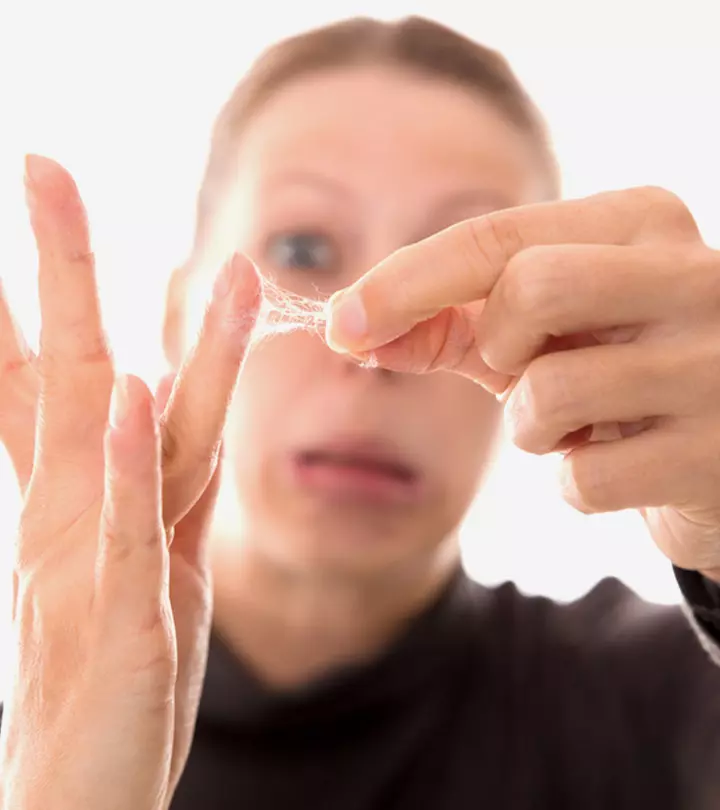
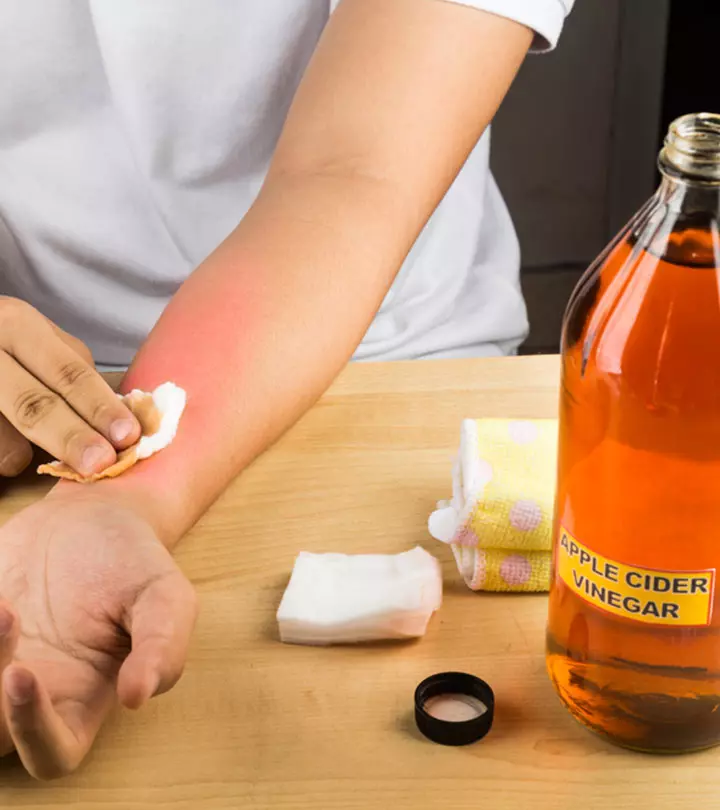





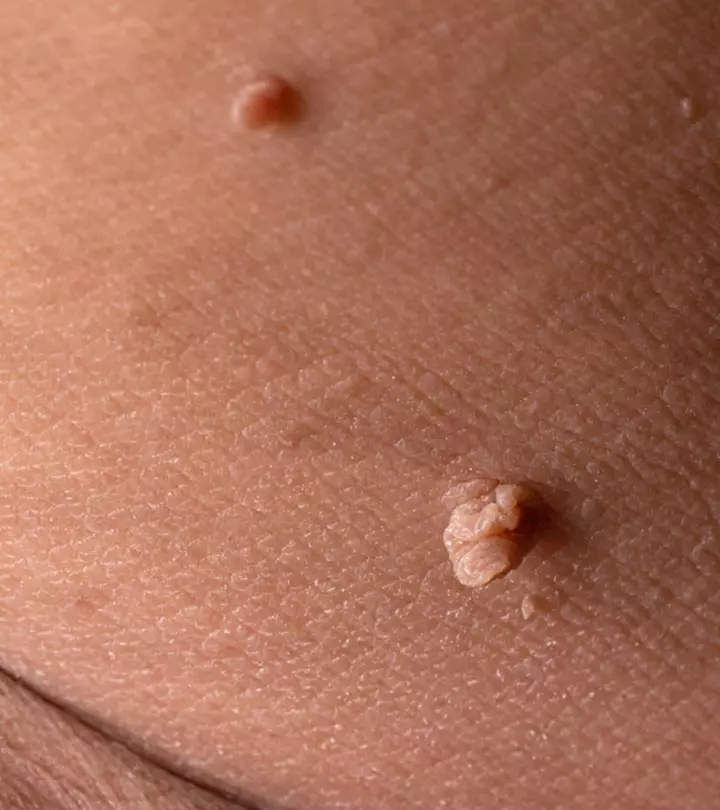
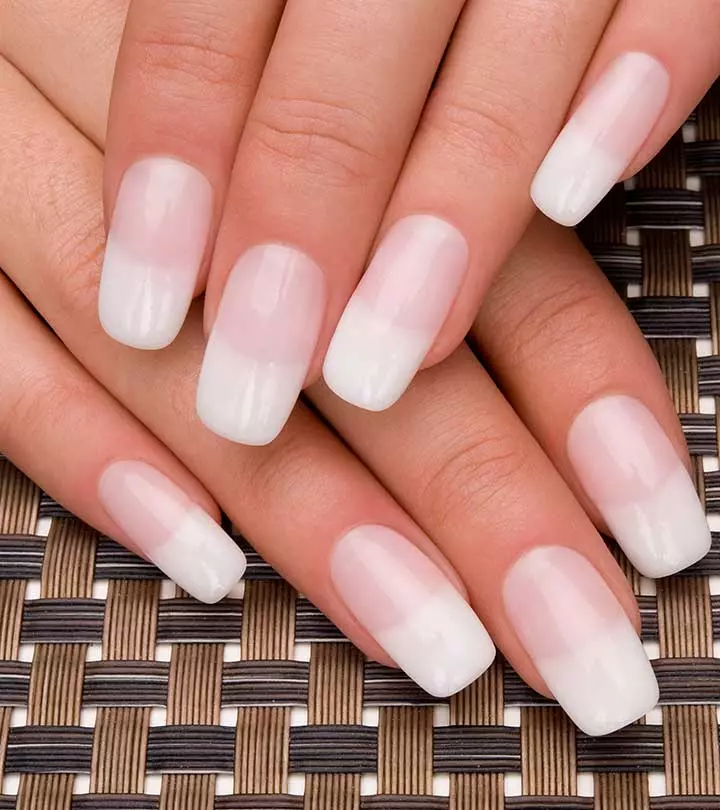
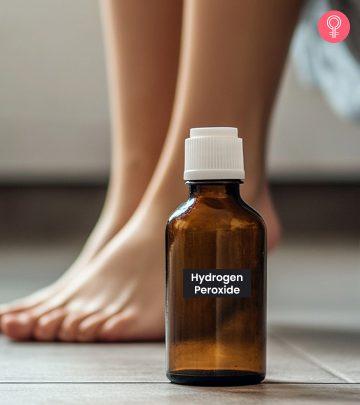

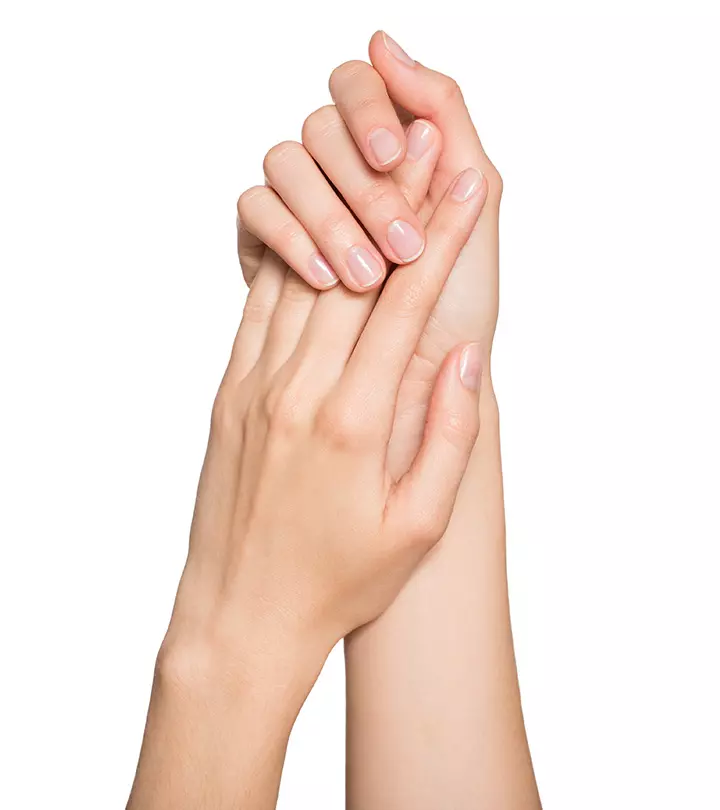


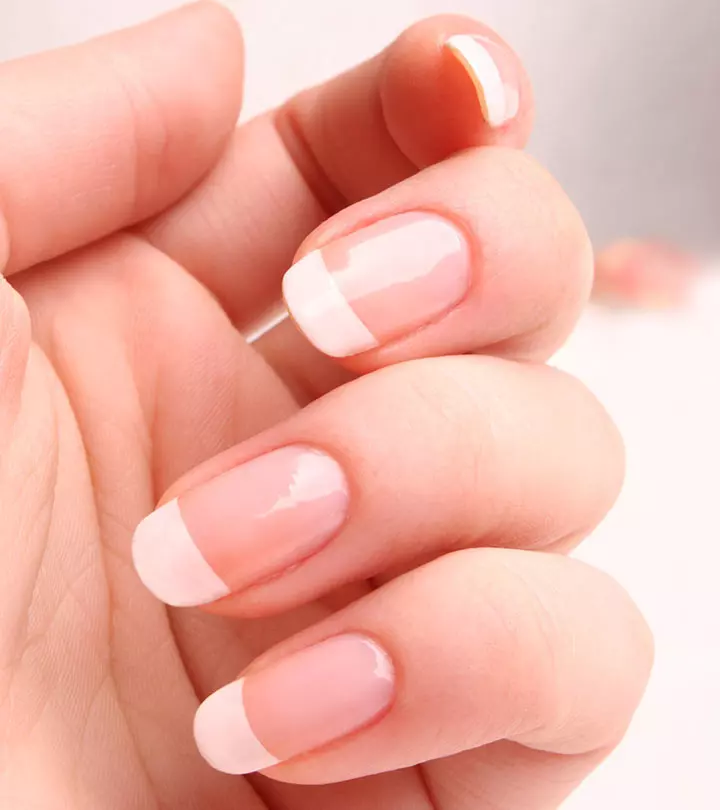

Community Experiences
Join the conversation and become a part of our empowering community! Share your stories, experiences, and insights to connect with other beauty, lifestyle, and health enthusiasts.